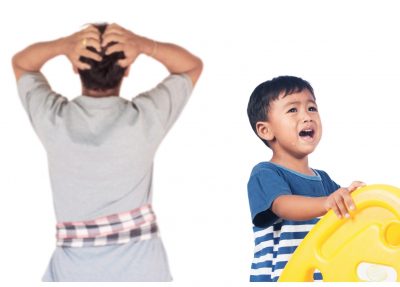by Tamara Kerr MSW RSW, MSc OT, Social Worker at the Toronto Children’s Therapy Centre

Tantrums, crying, screaming, yelling, hitting, and throwing things…sound familiar? These behaviours happen in every home with kids, whether people talk about it or not. Even more challenging – is the fact that children’s disruptive behaviours can often lead to parental meltdowns! The good news is that it is never too late, nor too early, to learn to be more aware of your own feelings and how they impact the way you behave. When you can identify feelings behind behaviours, it is easier to provide an appropriate empathetic response.
What is Emotion Regulation?
Emotional regulation is the ability to effectively manage and respond to a range of different emotional states (Institute of Child Psychology, 2020). It is a complex process that involves:
*subjective experience (your feelings)
*cognitive responses (your thoughts)
*biological/physiological responses (fight/flight response)
*behaviours (your physical expressions of feelings)
(Johnson & Schamuhn, 2020)
A regulated response involves noticing and monitoring feelings, in the moment, and being able to moderate the way you respond and behave.
Disregulation or challenges in emotional regulation can lead to intense or seemingly disproportionate emotional responses. This can include (but is not limited to) responses such as: screaming, yelling, hysterical crying, passive-aggressive behaviour, panic attacks, nightmares, clinginess, physical or verbal outbursts, self-harm, risky behaviour, or withdrawal. These types of responses can negatively impact all relationships and create a cycle of negativity in these relationships.
The development of emotional regulation is a significant life skill that will help any individual to navigate their world and relationships with others.
Key Factors in the Development of Emotional Regulation
Babies are not born with the ability to emotionally self-regulate. Emotional regulation develops within the context of a child’s first connected relationships. A child’s experience of being seen, feeling soothed, safe, and secure provides the foundation for the development of emotional regulation (Siegel, D., 2019). Development of this skill continues through one’s life and is dependent on the feedback from others (e.g. reactions of others) and the development of self-reflective capabilities.
As a child learns to self-regulate, skills such as concentration, sharing, taking turns, and problem solving can also develop. The development of each of these skills enhances a child’s ability to move from depending on others to being able to manage themselves.
Challenges
Most children, at some stage, will struggle with managing their feelings and controlling their behaviour, particularly when they are tired, hungry or facing new experiences. This is all part of growing up and is not necessarily cause for concern. However, for some children regulation skills take longer to develop. While caregivers have a responsibility to teach and model emotional regulation, it is important to know that every child is different and some will have more difficulty with this set of skills. Sometimes caregivers and their children need outside support to explore the challenges that can arise in developing emotional regulation.
Strategies
Emotional regulation strategies involve helping children understand their internal world, specifically, the noticing, managing, and adjusting of feelings and behaviours. When a child has a connected caregiver that can provide co-regulation (through modeling and management strategies) it will be easier for the child to learn and develop the skill.
When faced with a crying, screaming, or hitting child, it can often feel difficult to summon empathy. There is a vast range of common caregiver responses to these moments, and often these caregivers are left feeling ‘not good’ about themselves and how they reacted. Some caregiver responses can include, ‘tapping-out’, walk away, yelling, or losing control. These reactions can be accompanied by feelings of overwhelm, cluelessness, helplessness, and frustration. Children can test our own abilities to emotionally self-regulate. It takes practice and patience to regulate ourselves and respond to the intense behaviours of others with an empathetic connected response.
The good news is – it is never too late to start to learn to be more aware of your own emotions and to reflect on how they impact the way you behave and respond to your children. Whether you yourself are well regulated or not, you can teach someone else how to start to develop these skills for themselves.
Social Work at TCTC:
I am here to help! As a Social Worker I am trained to explore individual and family strengths that can be used to promote more positive relational dynamics and individual coping skills. I can join with and support individuals and families in the following ways:
- Work with parents to address specific behavioural challenges, explore the emotional context, and develop concrete strategies for supporting positive change.
- Work with the child or adolescent to address emotionally challenging situations and how to manage or cope, developing personalized coping and management plans and strategies.
- Work with the family unit to identify strengths that can be used to promote positive relationship dynamics and strategies to use in challenging situations.
Please contact us if you have any questions regarding emotional regulation, disruptive behaviour, or parenting in the face of such challenges. For more information about our services, please visit the TCTC website to learn about available programs.
References
Johnson, T. & Schamuhn, T. (2020). Fostering Emotion Regulation: From Fears to Tears [Unpublished presentation]. Institute of Child Psychology.
Siegel, D. (2019, June 10). Presence, Parenting, and the Planet. Retrieved from: Talks at Google, https://www.youtube.com/watch?v=Ouzb_Urt7LQ
